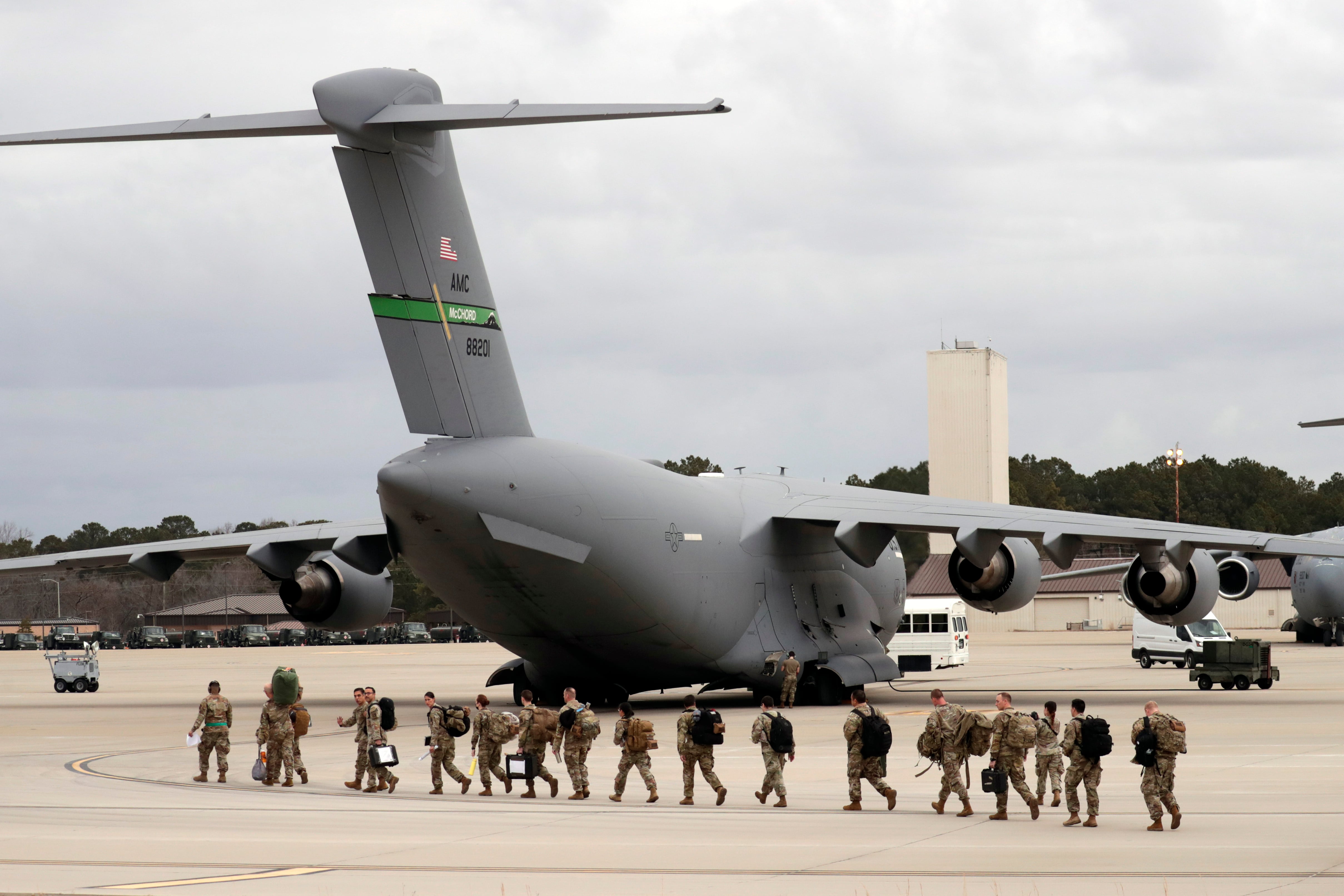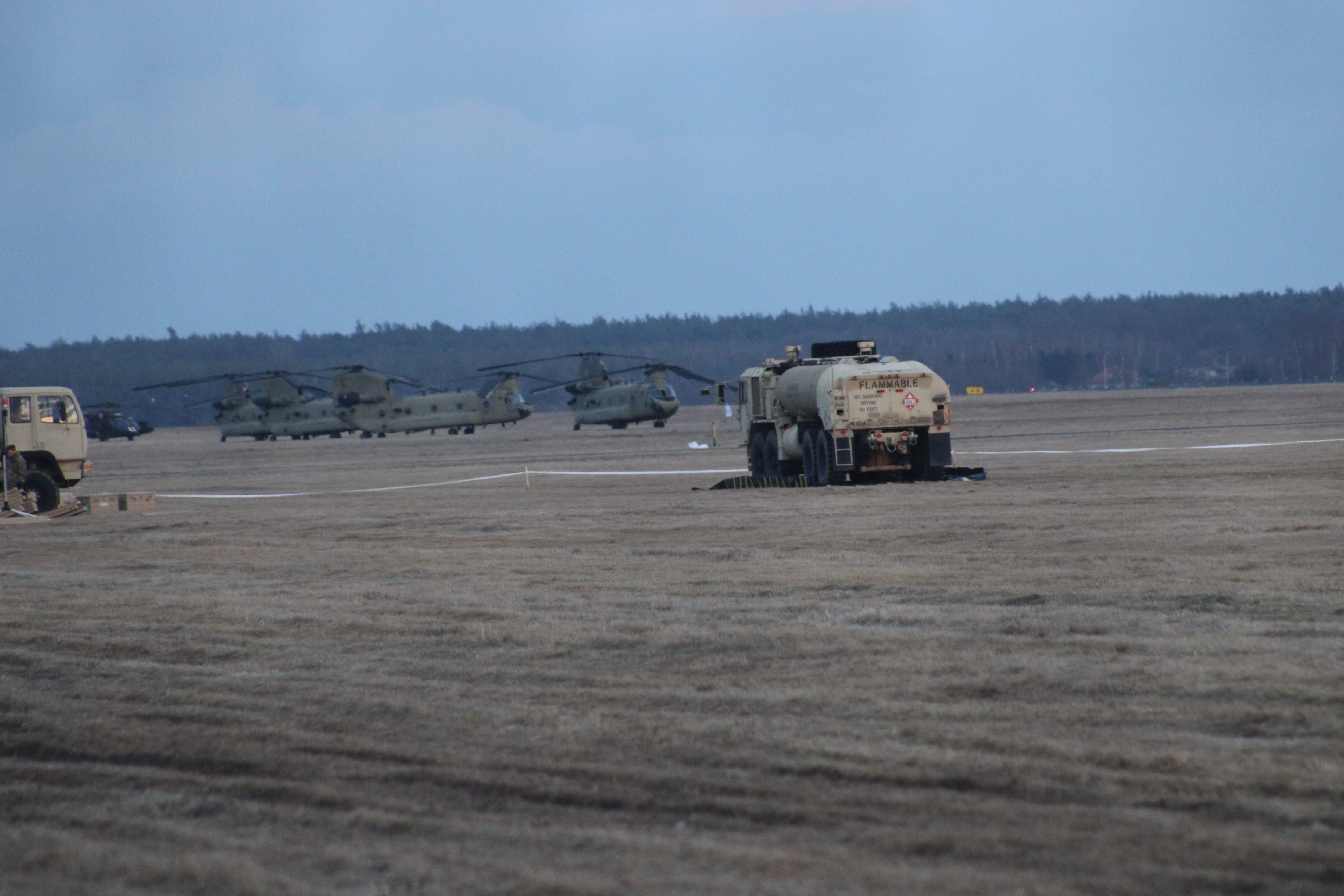For U.S. service members deployed in austere areas of Eastern Europe, the support the USO brings is big.
Take music, for example.
Troops from the 82nd Airborne Division were excited to get USO-supplied snacks and bags of goodies recently, said Grant McCormick, regional vice president for USO Europe, Middle East and Africa. “But they were even more excited when we started playing music and they were able to line dance,” he said. Troops aren’t able to bring cell phones, laptops or computers with them, and they hadn’t had any music in about two weeks, he said.
As one soldier told the USO: “Thank you guys and your organization for being here. This really means a lot to all of us as our morale in general has been really low, and it brightens our day when you come and see us.
“This is the first time since we got here that we’ve heard music.”
RELATED

For the 82nd Airborne, the USO was also able to step in with blankets, beanies, handwarmers and socks. “When soldiers hit the ground they were cold,” McCormick said. USO also works in partnership with the American Red Cross to provide needed items.
The USO is also assisting U.S. Air Force troops, McCormick said. For example, it provided support to airmen with the 48th Fighter Wing at RAF Lakenheath in Great Britain before that unit’s F-15s deployed to Eastern Europe. When F-35 pilots, maintainers and support personnel from the active duty 388th FW and the Reserve 419th FW out of Hill Air Force Base, Utah, deployed to Spangdahlem Air Base, Germany, the USO went there and is forward deploying from Germany, he said.
But the most important thing for many troops is the ability to call home. The USO has five unstaffed centers set up throughout Poland and other areas in Eastern Europe, with Wi-Fi, VOIP phones and cell phones. The devices provided for troops’ use include only the capabilities and sites that military leadership allows, McCormick said, based on the security requirements. USO follows the guidance from U.S. Army Europe, as well as the units, and abides by the most restrictive guidance, he said. In some locations, “all we can provide is the phone with zero video, and they can just call home,” he said.
USO opened a “hardened” USO center in Poland last year with all the amenities, such as TV, a pool table, ping pong table and gaming. The additional USO unstaffed centers are placed at the request of military leadership, and can quickly provide support such as Wi-Fi, fitness equipment and cell phones, McCormick said. “We can get the right support at the right place at the right time,” he said.
The unstaffed centers operate out of a tent provided by the military, and the USO provides couches, loveseats, chairs, lamps, ping pong tables and foosball tables. The USO also has USO2GO and portable boxed programs that include snacks, toiletries, games and sports equipment, providing some comforts of home and opportunities to relax.
USO also mobilizes its “expeditionary vehicle. It’s a food truck on steroids,” McCormick said. It also has Internet, TV and satellite, and can bring more entertainment for the troops, such as bingo kits and sports equipment. It also brings in barbecues, hot chocolate, snacks and other comforts — including “very well received” Super Bowl parties at several locations, he said.
USO aims to keep troops stocked with snack packs that include beef jerky, gum, sodas, snacks and other goodies; and with toiletry kits with hygiene items for men and women. Many of these packs and kits are provided to the troops before they deploy by USO personnel at the their home installations, and they’re restocked overseas.
RELATED

In some areas, the troops have access to the mobile exchanges brought in by the Army and Air Force Exchange Service, but in some remote tactical assembly areas, troops don’t have anything, McCormick said. This weekend, a USO team will be visiting tactical assembly areas, he said to provide capability for soldiers to call their loved ones, and some recreational programming.
The USO also established a Joint Expeditionary Team last year, with USO employees who have volunteer to go wherever needed to support troops in austere environments. These team members move to different forward locations.
The USO uses both its own logistics as well as help from military logistics in Europe to help get items such as thousands of blankets and snack packs out to the troops.
“I’m concerned about our service members in these kinds of austere locations. Some of them are sleeping on the ground,” McCormick said.
“How do you capture the excitement and the joy of a service member when the USO shows up with programming and does something like line dancing or bingo or trivia…. Or shows up with blankets or handwarmers and provides phones to call loved ones?”
Karen has covered military families, quality of life and consumer issues for Military Times for more than 30 years, and is co-author of a chapter on media coverage of military families in the book "A Battle Plan for Supporting Military Families." She previously worked for newspapers in Guam, Norfolk, Jacksonville, Fla., and Athens, Ga.




